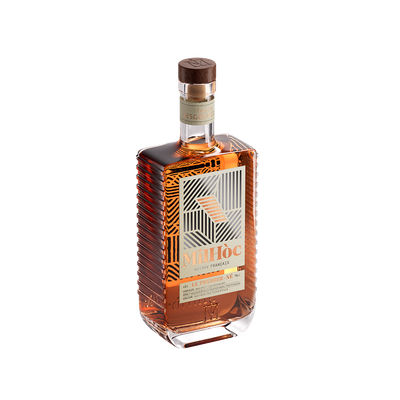French Whisky
What is French Whisky?
French whisky represents a distinctive category within Other Whiskey that combines traditional whisky-making techniques with France's rich distilling heritage and unique terroir. What defines French whisky is its production in France using locally sourced grains, often including heritage varieties, and its aging in French oak barrels that impart subtle vanilla and spice notes different from American or Scottish oak. Many French distilleries also bring their cognac and armagnac expertise to whisky production, creating spirits with exceptional smoothness and complexity that reflect France's centuries-old mastery of distillation.
Learn More About French Whisky
What makes French Whisky unique?
French whisky stands apart through its innovative use of different grain varieties and distinctive aging techniques, often incorporating wine barrels and cognac casks that reflect the country's rich viticultural heritage. Many French distilleries experiment with local ingredients like buckwheat, chestnuts, and heritage grains, creating flavor profiles you won't find anywhere else. The country's relatively young whisky industry also means distillers approach production with fresh perspectives, combining traditional Scottish and Irish methods with uniquely French touches like finishing in Sauternes or Burgundy barrels.
How is French Whisky made?
French whisky production follows traditional methods but with distinctly Gallic touches, starting with locally grown grains like wheat, barley, and corn that are mashed, fermented, and distilled in copper pot stills or column stills. The new-make spirit must age in oak barrels for a minimum of three years, though many French distillers experiment with different oak types including French Limousin oak, which imparts unique tannins and flavors compared to American oak. What sets French whisky apart is the frequent use of wine barrels for finishing – from Cognac and Armagnac casks to Bordeaux and Burgundy barrels – giving these whiskies a sophisticated, wine-influenced character that reflects France's deep viticultural heritage.
How do you drink French Whisky?
French whisky shines brightest when sipped neat or with just a splash of water to open up its complex flavors, though it's equally delicious on the rocks if you prefer a slightly chilled experience. When it comes to cocktails, French whisky works beautifully in spirit-forward drinks like Old Fashioneds, Manhattans, or whisky sours where its unique character can still come through. These whiskies are perfect for cooler weather sipping and special occasions when you want to showcase something distinctive - their elegant profiles make them ideal for intimate gatherings or quiet evening contemplation rather than rowdy party settings.
How do I choose good French Whisky?
Start by considering the distillery's background—look for producers with experience in cognac or wine, as they often bring sophisticated barrel management skills to whisky making. Your cocktail plans should guide your selection: pick something with bold, distinctive character for spirit-forward drinks like an Old Fashioned, while lighter, more delicate expressions work beautifully in cocktails where you want subtle complexity without overpowering other ingredients. French whiskies often showcase unique finishing techniques using wine or cognac barrels, so don't be afraid to explore these experimental expressions that offer flavors you simply won't find in Scotch or American whiskey.
Nutritional Information
Typical Calorie Range per Ounce: 65-70 calories
Typical Carbohydrate Range per Ounce: 0-0.1 grams
Typical Sugar Range per Ounce: 0 grams
Typically Gluten Free: No
French whisky is typically made from grains that contain gluten, including wheat, barley, and rye. While the distillation process removes most gluten proteins, some sensitive individuals may still react to trace amounts. Always check detailed product information and consult with the manufacturer to confirm gluten-free status if you have celiac disease or gluten sensitivity.
Scrolled this far? Your reward? French Whisky Trivia!
- French whisky makers can legally use any type of wood for aging – While Scotch whisky must age in oak, French distillers experiment with chestnut, acacia, and even cherry wood barrels. Domaine des Hautes Glaces uses French oak from Limousin forests, creating flavors you'll never find in American or Scottish whiskies. The result? Whisky that tastes like it was kissed by French wine country.
- One French distillery grows six different grain varieties on the same property – Warenghem in Brittany cultivates buckwheat, barley, wheat, rye, corn, and spelt all within walking distance of their stills. They're essentially making field-to-glass whisky, controlling every step from seed to sip. Try explaining that level of terroir control to your bourbon-loving friends.
- French whisky production predates the official recognition by nearly two decades – Distillerie des Menhirs started making whisky in 1983, but French whisky wasn't legally recognized as a category until 1999. For sixteen years, French distillers were bootlegging their own whisky classification, creating exceptional spirits that couldn't officially call themselves whisky on home soil.
- Some French distilleries finish their whisky in Calvados barrels that are over 100 years old – Michel Couvreur sources antique Calvados casks from Normandy orchards, some dating back to the 1800s. These ancient apple brandy barrels impart flavors so complex that tasting notes read like a French pastry menu – think baked apple tart with vanilla custard and cinnamon spice.
- French whisky makers steal techniques from Champagne production – Distillerie G. Rozelieures uses the méthode champenoise riddling process during fermentation, manually rotating their grain mash to create more consistent flavors. They're literally applying 400-year-old sparkling wine techniques to whisky production, proving that French innovation knows no category boundaries.
Higher-proof spirits can be intense. Mix carefully, taste thoughtfully, and enjoy responsibly.
Gift message (optional)

